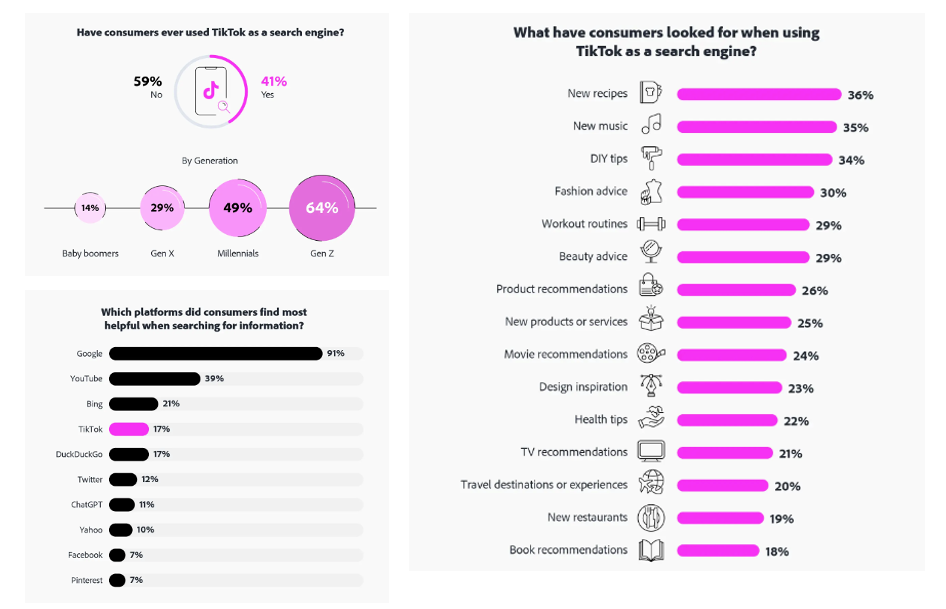SGE Failure to Launch, Quality Raters Axed, What's Wrong at Google?

SGE: Failure to Launch?
There have now been several studies of the impact of Google SGE on search results (BrightEdge, Authoritas, others). All conclude, with varying degrees of confidence, that SGE could (or will) have a profound impact on the SERP and reduce organic traffic. But there's increasing evidence that SGE, as it exists today, may never escape labs into general availability – as we discussed on the most recent Near Media podcast. Google has seemingly beaten back the "AI assistant" threat. BingGPT has failed to gain market share; ChatGPT is widely used but seemingly not a direct challenge to search (at least at the moment). And while TikTok is being used by GenZ and others as a search engine in selected cases (e.g., recipes, music), it doesn't appear to threaten Google's market share or revenues. There's also evidence that TikTok usage is starting to slow, amid aggressive attempts to monetize: TikTok Shop. There is growing dissatisfaction with Google search results, as the TikTok search data suggest – people like the "authenticity," personalization, storytelling and visual nature of short video – but that's not going to immediately translate into market share losses for Google. As a consequence, Google is under no pressure to fully roll out SGE. Instead it will likely serve, as Google says, simply "as a testbed for bold new ideas."

Our take:
- Google will integrate AI features into search but we're unlikely to see SGE launch in its current form. The more interesting product to watch is Bard.
- SGE was a "defensive" response to ChatGPT and BingGPT, and an effort to beat back bad PR that was hurting its corporate valuation. It largely succeeded.
- Google's brand image has suffered and it will continue to see user erosion but, as with Twitter, there's no truly viable alternative – yet.
Google Gives Quality (Raters) the Ax
Google abruptly terminated its contract with a company called Appen, which is one of its quality rater contractors. In 2023 Google paid ~$82 million to Appen, which represents thousands of positions. There are at least two other Google contractors that perform the same functions; however, Appen was reportedly one of the larger ones. This may be part of a larger reallocation of resources going on within the company. Google is laying off thousands of employees across the organization as it builds AI into more products (and needs fewer people); also to make room for more AI investment, which may in turn prompt future workforce reductions. The Appen decision was opaque and it's not clear what this means for the human quality rater program, which has played an important role in Google's efforts to boost and maintain search quality. Some on Twitter have speculated that Google may partly fault quality raters for the widely perceived degradation of search results and so this may be the fallout. All we can do for the time being is speculate about Google's rationale and "wait-and-see" its impact.

Our take:
- Google may believe that AI can increasingly step in for quality raters and that it can rely on fewer contractors going forward.
- In tandem or alternatively, it may simply be "clawing back" the $82 million for other projects (read: AI development/salaries) elsewhere in the company.
- This could be the beginning of the end for the current quality raters program. Yet Google still needs humans in the mix to train AI and check SERPs.
- Update: It appears this may have been a response to wage increases for Appen raters. Google will the work shift to other contractors.
What's Wrong at Google?
On numerous podcasts we've lamented Google's tendency to develop incomplete products, launch them early and later neglect or abandon them. The GBP roadmap is a case-in-point. Despite Google's continued dominance, there's now a debate happening about what went wrong. Does Google need a leadership change or does it need to completely overhaul its culture – or both? Current Google software engineer Diane Hirsh Theriault unleashed a stinging critique of Google leadership on LinkedIn: "Google does not have one single visionary leader. Not a one. From the C-suite to the SVPs to the VPs, they are all profoundly boring and glassy-eyed." Her missive is in apparent response to layoffs. She adds that many Google employees are increasingly disengaged: "There is a pervasive sense of nihilism that has taken hold. 'Well, I guess I will just do the job until they fire me.'" Other insiders have blamed Google's "pattern of hiring and empowering psychotic pricks who were presumably 'good at business.'" Still others argue it's really the culture – a lack of commitment to products (that don't get 100 million users in six months) rather than a lack of vision. And some blame Google's "decline" on its Wall-Street orientation or that it has become like a telco of old, conservative, married to revenue predictability and fearful of making bold decisions.

Our take:
- All of the above is the right multiple choice answer to the question: what's wrong at Google?
- Leadership matters. Think about how Steve Ballmer –> Satya Nadella at Microsoft has radically transformed that company.
- As companies age/grow they necessarily change, but Google has now become the kind of entity it said it never would be: "a conventional company."
Recent Analysis
- Near Memo episode 142: SGE not the future?, GBP end times? Google chooses sizzle over steak.
- LSA Home Services Scam: A Marketer's Insight, by Mike Blumenthal.
Short Takes
- New GBP "nearby events and deals" tiles showing for restaurant queries.
- More GBPs changing hours to "open 24 hours" to rank better.
- More evidence that Google is elevating forums in SERPs.
- UK case study: online local inventory drives in-store sales.
- PPC advertisers in EU about to see campaign performance drop.
- The unaddressed problem of AI deepfakes is just getting started.
- Apple Vision Pro pre-orders sold out, but "demand intensity" may be soft.
- Amazon is out of its mind if it thinks people will pay for Alexa.
- How Google plans to make AI/LLMs more reliable and accurate.
- Why LLMs and internet content may face a downward quality spiral.
- Product liability claims against social media defeating Section 230 defenses.
- Study: brands don't understand what customers really want.
Listen to our latest podcast.

How can we make this better? Email us with suggestions and recommendations.

